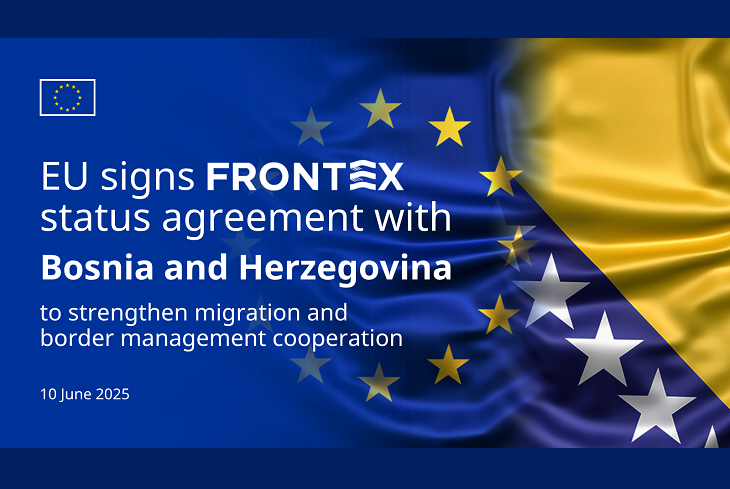
Today, the European Union and Bosnia and Herzegovina strengthen migration and border management cooperation by signing a new Status agreement between the European Border and Coast Guard Agency (Frontex) and the authorities in Bosnia and Herzegovina. It will allow Frontex to carry out joint operations with Bosnia and Herzegovina and deploy its standing corps anywhere along the country's borders, including on the borders with neighbouring non-EU countries, as well as at border crossing points including airports.
Stepping up the cooperation on border management is a key element of the EU's engagement with Western Balkan partners, preventing irregular border crossings and strengthening the security of the region. These joint efforts have led to a significant decrease in irregular border crossings, from 145,600 in 2022 to 21,520 in 2024. This downward trend continues in 2025, with a further 58% drop in the first four months.
This agreement delivers on the EU Action Plan on the Western Balkans from December 2022. Its implementation continues, in close cooperation with Western Balkan partners. It shows positive results, reducing migratory pressure and secondary movements on the Western Balkans route.
The agreement was signed today by Commissioner for Internal Affairs and Migration, Magnus Brunner, and Chairwoman of the Council of Ministers of Bosnia and Herzegovina, Borjana Krišto.
Next steps
The Frontex status agreement will enter into force following the consent of the European Parliament and the Council as well as the national ratification procedure in Bosnia and Herzegovina. The status agreement will be provisionally applicable from the moment of signature.
Background
Frontex has advised Bosnia and Herzegovina since 2009, on the basis of a Working Arrangement between Frontex and the Ministry of Security of Bosnia and Herzegovina. Standing corps officers are currently deployed at the Sarajevo Airport under the 2009 framework.
Today's new status agreement is the sixth agreement based on the reinforced 2019 mandate of Frontex. The first was signed with Moldova in March 2022, the second was signed with North Macedonia in October 2022, then Montenegro in May 2023, Albania in September 2023 and Serbia in June 2024.
Individual operations conducted based on this agreement are negotiated directly between Frontex and the Border Police of Bosnia and Herzegovina. Any Frontex deployment outside the Union requires a request by the host country and the ensuing conclusion of an operational plan between the agency and its national counterpart.
Frontex has nearly 500 officers in the Western Balkans and ongoing joint operations in Albania, North Macedonia, Montenegro and Serbia. The EU supports Western Balkan partners with training, as well as deployment of border officials and equipment through the Instrument for Pre-accession Assistance (IPA), in coordination with Member States' bilateral actions and based on the needs identified by the Western Balkans authorities.
For more information
Quote(s)
Bosnia and Herzegovina is a vital partner in ensuring effective migration management along the Western Balkans route. Today’s agreement is another step to keep working towards a strong, coordinated action in protecting our shared space. With this agreement, Frontex can extend its support to Bosnian border guards, enhancing capacity, strengthening the rule of law, and tackling migrant smuggling.
Henna Virkkunen, Executive Vice-President for Tech Sovereignty, Security and Democracy
Thanks to close cooperation with Western Balkan partners, irregular border crossings along this route have dropped by nearly 95% compared to 2022. This confirms that working together brings tangible results and that the Western Balkans are an integral part of Europe’s stability and security space. Today’s agreement with Bosnia and Herzegovina is another important step in strengthening our shared responsibility for effective border management and a safer Europe.
Magnus Brunner, Commissioner for Internal Affairs and Migration
Details
- Publication date
- 11 June 2025
- Author
- Directorate-General for Enlargement and Eastern Neighbourhood
